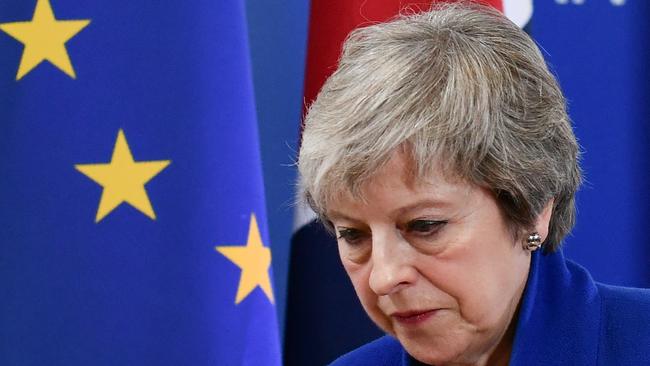We need to stop being so English about Brexit
Brexit isn’t really British. It’s English. It dreams of independence from the EU but forgets England is inconveniently shackled onto a bunch of other places.

Perhaps you have noticed the one thing that all big, unexpected, potential roadblocks to Brexit seem to have in common. You see, there is a land that Brexiteers love and it has impregnable borders of white cliff and three lions on its shirt. Granted, Jerusalem was not builded here, perhaps due to some problem with the mills, but they still believe, these Brexiteers, that it could be. Only, these roadblocks? These issues? These things that rear up and make what had been so simple and beautiful and clear such a tangled, intractable mess? The thing about them is they don’t happen there. Almost universally they happen somewhere else.
Let’s start with Gibraltar. Remember Gibraltar? Once, having that ape-strewn rock was vital to Britain being Great. Today, it’s somewhere we vaguely forget about until Johnny Spaniard makes a fuss. Last week, the Spanish PM Pedro Sanchez briefly threatened to derail the Brexit withdrawal agreement unless we offered concessions over Gibraltar’s status in future trade deals between Britain and the EU. This seems to have come as a surprise. As is traditional, nobody expected the Spanish inquisition.
Or, take Northern Ireland. This small chunk of land, with a population less than the size of Greater Manchester’s, very nearly made Brexit unworkable and still may. The reasons why are not complicated. Think of it as an architectural challenge: how can you have an open-plan kitchen/lounge, and also an open plan lounge/hall, but still have a smell-proof wall between your kitchen and your hall? Answer: you can’t, dummy, don’t be daft.
In a nutshell, Brexit is all about strengthening borders with the EU, but here is a bit of the UK which has an open land border to the rest of the EU. “Woah!” one can almost imagine various Leavers saying to each other over the past two years, “how the hell did we miss that?” Although, in fairness, the Remain campaign hardly went big on Irish issues, either. It was only Northern Ireland, after all. Who really cared?
Or, take Scotland. The political problem there, of a Brexit imposed on a devolved political system where 62 per cent of people voted against it, ought to bother any democrat. Paradoxically, Scotland’s complaints are to do with too little Brexit, rather than too much. In a UK context, fishing represents half a per cent of GDP, meaning that concessions to the EU over access to waters are a totemic, faintly silly political fight. Yet two thirds of that catch and fleet are in Scotland, and all of Scotland’s 13 Tory MPs have said that fisheries must not be bargained away in a broader EU trade deal. David Mundell, the Scottish secretary, has repeatedly threatened to resign if they are. This sort of grievance is the greatest recruiting sergeant there is for Scottish nationalism. That’s true even when there is nothing in particular to feel aggrieved about, let alone at times like now when there most certainly is.
As a Scot, I must admit, this one feels the most visceral to me. I know handfuls of other Scots, if not scores, who found their instinctive Unionism fleeing from the heart to the head after the Brexit referendum, and not always staying put even there. The core, non-economic argument made against Scottish independence by the likes of me — that Scotland and England were similar nations, full of similar people who wanted similar things — often feels coldly ludicrous now. Should another independence referendum come, and I think it will, I’m not sure what I’ll say. Or what anybody will.
For Brexiteers up to and including the prime minister all such concerns are an irritation, at best. Much like the worries of Gibraltar, or Northern Ireland, or indeed much like the fears of other EU nationals resident here, none of these fundamental British complexities are quite the point.
This is because Brexit is not really British. It is English, and always has been, and merely uses the wrong flag. It dreams of English independence from the EU but seems to forget that England is inconveniently shackled onto a whole bunch of other places. Brexit’s vision is of a single island with a single people on it, or at least perhaps with a wall in the north like Westeros. Only this is not what we are. In a sense, each and every Brexit compromise has been the consequence of a belated acceptance that, even once England has left the European Union, it will still be firmly entangled in a British one. So compromises must still be made and sovereignty must still be pooled. At least until you leave that one, too.
Some, I suspect, will want to, although maybe they will have some opposition. Perhaps rather than chopping the legs off the case for the UK, Brexit — should it actually happen — will serve to strengthen it. Is that too optimistic a dream? I wonder. Since the vote, and two years too late, Remain has developed emotional, passionate arguments of its own. On the streets in their marches and online with their hashtags, you see an urge to transcend narrow national interest and to be part of a greater political whole.
Is there any chance that all this could be transferred into a defence of the other, smaller Union we will still be in? It has been hard to say, perhaps for a generation, quite what Britishness is. Maybe Brexit has shown us the way. We are a frustrating mess, yes, but perhaps a glorious one. Pull our pieces apart, however discrete they look, and they will actually make no sense at all.
THE TIMES


